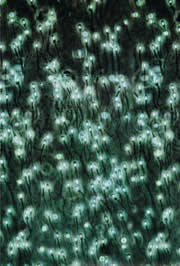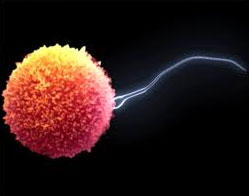 Sperms are produced in an outer part of a man's body. The reason for this is the fact that sperm production can occur only in a suitable environment with a temperature of about 35 degrees Celsius, which is two degrees below the average body temperature. Male testicles are the only body parts with this temperature, as they are rightly placed outside of the body. To bring the temperature to the required level, another mechanism is activated. The skin covering the testicles shrinks when it is cold and sweats when it is hot to keep the temperature of this area stable. Approximately a thousand sperms are produced per minute, and they have a special creation that eases their long journey from the man's testicles to the woman's egg. A sperm comprises a head, a neck and a tail by the use of which a fish-like movement towards the mother's uterus takes place.
Sperms are produced in an outer part of a man's body. The reason for this is the fact that sperm production can occur only in a suitable environment with a temperature of about 35 degrees Celsius, which is two degrees below the average body temperature. Male testicles are the only body parts with this temperature, as they are rightly placed outside of the body. To bring the temperature to the required level, another mechanism is activated. The skin covering the testicles shrinks when it is cold and sweats when it is hot to keep the temperature of this area stable. Approximately a thousand sperms are produced per minute, and they have a special creation that eases their long journey from the man's testicles to the woman's egg. A sperm comprises a head, a neck and a tail by the use of which a fish-like movement towards the mother's uterus takes place.
The head part, which carries the genetic code of the future human being, is covered with a special protective armour. The benefit of this armour is noticed at the entrance of the mother's uterus. This place is very acidic to protect the mother from microbes and other alien particles like sperms, but by the use of this armour, most sperms manage to stay alive.
Not only sperms are ejaculated to the uterus. Semen is a mixture that consists of many other liquids. These liquids contain sugar that supplies energy to the sperms. Semen, which is a base in its chemical form, neutralizes the acidic environment at the entrance of the uterus and creates a safe environment for sperms. It also makes the environment slippery so that sperms can move along easily. Sperms make a difficult journey inside the body of the mother until they reach the egg. No matter how hard they try to survive, only a thousand sperms out of 200-300 million can make it to the egg. How can a sperm make itself so suitable for entry into the mother's uterus, about which it knows nothing beforehand? How can a sperm be produced in the male body in a way that it can survive and find its way to the egg in the female uterus in spite of the protective mechanisms of the female body, about which the sperm had no previous idea? How can this happen?
How can a sperm make itself so suitable for entry into the mother's uterus, about which it knows nothing beforehand? How can a sperm be produced in the male body in a way that it can survive and find its way to the egg in the female uterus in spite of the protective mechanisms of the female body, about which the sperm had no previous idea? How can this happen?
Since a sperm lacks the ability to adapt itself to an unknown environment in advance, the only possible answer to these questions is that it is actually created that way.
Let's continue with the brief story of birth:
An egg is about half the size of a salt grain. The place where an egg and a sperm meet is an area called the Fallopian tube. The egg secretes a special fluid that leads the sperms to the egg. As they come closer to the egg, their protective armour is melted by another fluid secreted by the egg. As a result, solvent enzyme sachets appear on the cover of the sperms' heads. By the use of these enzymes, the sperm that is to fertilize the egg, penetrates the membrane of the egg. When the sperms surround the egg, they race one another to enter to the egg. Mostly, only one sperm fertilizes the egg and from that time on, there is no possibility for another sperm to enter it. Before fertilization, the electric charge of the sperms and the egg are opposite, therefore they attract each other. However, after the entrance of the first sperm, the electrical charge of the egg changes, acquiring a pushing effect on the rest of the sperms.
Finally, the DNA of the male present in the sperm combines with the DNA of the female. At this moment, there forms a new cell (the zygote), that is, a new human being inside the mother's womb.
After considering this bit of information, a new question comes to our minds: How is it that an egg is prepared to welcome a sperm as if it "knew" that it would meet the sperm? How can this happen? The only possible answer to this question is that the egg is created to be suitable to the sperm by the will of a Creator Who has also created the sperms and controls both the sperm and the egg.
The extraordinary nature of birth does not finish with all this. In fact this is only the beginning of the stages of the creation of humans. The fertilized egg clings on to the womb by its special knobbly surface. The small protuberances on the surface of the egg jut out and penetrate deep into the mother's womb like the roots of plants in the ground. The zygote starts to develop through hormones secreted by the mother. The egg keeps receiving nutrition provided by the mother.
With time, the cells divide and grow in folds by the two-four-eight-sixteen model. In the beginning, all cells that are formed by the division of old ones have the same properties as each other. Then, all of a sudden, newly formed cells somehow start differentiating, showing separate characteristics, as they are to form different organs of the fetus. The science of today still lacks the competence to give a satisfactory answer to the question of why and how exactly this differentiation of cells takes place and how they form different organs with such perfect organization. As time passes, a drastic change takes place in the jelly-like fetus. Relatively rough bones start to form inside that soft structure, all of them surprisingly, in their proper places. What's amazing here, is that while all the cells carry exactly the same characteristics at the beginning, through the differentiating process, some of them turn out to be eye cells sensitive to light, others become nerve cells that perceive heat while yet others form those cells that detect sound vibrations.
As time passes, a drastic change takes place in the jelly-like fetus. Relatively rough bones start to form inside that soft structure, all of them surprisingly, in their proper places. What's amazing here, is that while all the cells carry exactly the same characteristics at the beginning, through the differentiating process, some of them turn out to be eye cells sensitive to light, others become nerve cells that perceive heat while yet others form those cells that detect sound vibrations.
Finally the fetus' construction is completed and a new baby is born into the world. At this stage, it is 100 million times bigger and 6 billion times heavier than its initial form when it was a fertilized egg.
How can cells of the same structure start to gather in groups and form different organs of the body while they multiply? How can the cells divide into groups while they are multiplying and form different organs of the body?
The fact that we come across at this stage is this: Actually, there is no answer to these questions about birth other than accepting the Presence of a Creator. It would be a great mistake to think that all of these complex operations occur "on their own" or by chance. How can unconscious cells "agree" to form human organs? However, one seeks such a consciousness that might give rise to such a perfect system in nature in vain. Nature itself is a whole made up of lifeless and unconscious atoms and has no decision-making powers."
Another attempt to answer this question might be to refer to the mother and the father – which would be wrong. Neither mother nor the father is aware what goes on within them. In spite of this, mother and father are seen as the "cause of one's life", and are therefore loved and respected.
One must reflect then: Is not Allah, the real Creator, Who has the ultimate power and controls one's everything including birth, life and death, worth more love and respect? His existence is clear and the existence of any other thing without Him is not possible.
The miracle of man's creation is explained in the Qur'an as follows;
"We created man from a quintessence (of clay);
Then We placed him as (a drop of) sperm in a place of rest, firmly fixed;
Then We made the sperm into a clot of congealed blood; then of that clot We made a (fetus) lump; then We made out of that lump bones and clothed the bones with flesh; then We developed out of it another creature. So blessed be Allah, the noblest of Creators!" (Surat Al-Muminun: 12-14)
The miracle of creation is referred to as follows in other verses of the Qur'an:
Does man reckon he will be left to go on unchecked? Was he not a drop of ejaculated sperm, then a blood-clot which He created and shaped, making from it both sexes, male and female? Is He who does this not able to bring the dead to life? (Surat al-Qiyama: 36-40)
... No female becomes pregnant or gives birth except with His knowledge. And no living thing lives long or has its life cut short without that being in a Book. That is easy for Allah. (Surah Fatir: 11)
 The human is a being created by Allah and as a created entity, he cannot change this fact. He cannot bring any other explanation to his own existence. Since he has been created, he would not be left uncontrolled and irresponsible as emphasized in the above verses. There is, of course, a purpose for creation. Where then will one find what the purpose is?
The human is a being created by Allah and as a created entity, he cannot change this fact. He cannot bring any other explanation to his own existence. Since he has been created, he would not be left uncontrolled and irresponsible as emphasized in the above verses. There is, of course, a purpose for creation. Where then will one find what the purpose is?
There is only one answer to this question and that is in the book that Allah has sent down to him.


